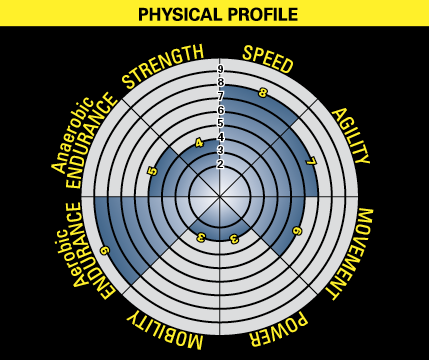By Damon Leedale-Brown, Sports Scientist & Conditioning Specialist
Last month in Part 1 of this article we outlined the physical demands of squash and included examples of statistics from elite level play. In this month’s article, we will look at using a simple technique to evaluate your physical abilities, which will lead to a better understanding of the training that will most benefit your development as a squash player.
Most elite athletes will undergo a series of assessments and evaluations, often with specialist staff (i.e., physiologists, psychologists), using advanced testing equipment. Clearly most of you will not have access to this level of support, so we will be looking for tools that are cost effective, easy to perform, and available to any aspiring athlete or coach. The key is to find tools that remain helpful in learning a great deal about your physical abilities in squash.

Performance Profiling
One such tool is “Performance Profiling,” which has been used with elite athletes in sports for many years. Essentially, Performance Profiling is a way to get a performer to identify the qualities necessary to achieve top performance in their sport, and then to evaluate how they match up against each of these qualities. It is an effective way to get the player more involved in the training process and to actually make them think about their strengths and weaknesses, rather than relying solely on feedback from external sources (i.e., the coach, support staff).
Thinking back to Part 1 of this article and the physical qualities important for success in squash, we came up with a list that includes: Endurance, Strength, Speed, Power, Balance, Agility and Mobility. Feel free to add or modify this list according to your own perceptions of what is important. This in itself is a really useful learning process and it will probably help to write a short definition of what each quality actually means to you. For example, under Strength, you might put “Strength in the legs and trunk to get into and hold lunge positions with complete balance and control.” Having a clear definition for each quality will make it easier for you to really consider your physical abilities on the squash court and to rate your abilities as accurately and honestly as possible.
Simply go through each of these qualities and rate yourself in each area on a scale of 1-10, where 1 would relate to a very poor perceived ability and a score of 10 would indicate that you already consider yourself excellent in this area and could not improve (for most athletes we would not expect to see many 10’s on their initial profiles!). Try not to spend too much time analyzing each quality—trust your first impressions or feelings, and try to assign scores across the whole range of the scale. This scoring information is traditionally displayed in a visual manner, such as a circular chart or bar chart; however, you can display it in whatever way works best for you.
As a member of the England Squash National Teams, each player would complete profiles across all areas of their game (i.e., Physical, Tactical, Mental, Technical). In addition, we would get the coaches to complete profiles of all players they worked with; this is something you can easily do if you work with a coach. Profiling like this helps encourage open and honest communication between player and coach; it instigates discussion regarding any major differences in perceived abilities, and it causes both player and coach to reach an agreement as to what future training and performance goals should be.
Remember, it is typical for coaches and players to see performance from different perspectives. This is inevitable, as each brings a unique set of experiences and viewpoints to the sport. If there are any major discrepancies between player and coach ratings, then other assessments can be made to provide a more detailed analysis of physical qualities that relate to the player and sport. This could include detailed video analysis and specific physical assessments—an area we will cover in more depth next month. Have fun profiling!


